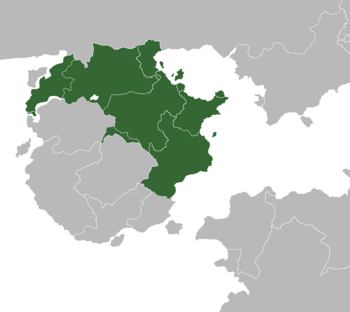Northern Confederation: Difference between revisions
Jump to navigation
Jump to search
mNo edit summary |
mNo edit summary |
||
| Line 9: | Line 9: | ||
|flag_caption = Flag (2000) | |flag_caption = Flag (2000) | ||
|flag_border = <!--set to no to disable border around the flag--> | |flag_border = <!--set to no to disable border around the flag--> | ||
|image_coat = | |image_coat = File:NC Arms.png | ||
|alt_coat = | |alt_coat = Arms (2000) | ||
|symbol_type = <!--emblem, seal, etc (if not a coat of arms)--> | |symbol_type = <!--emblem, seal, etc (if not a coat of arms)--> | ||
|image_map = File:NC Locator.png | |image_map = File:NC Locator.png | ||
Revision as of 22:13, 6 March 2023
This article is a work-in-progress because it is incomplete and pending further input from an author. Note: The contents of this article are not considered canonical and may be inaccurate. Please comment on this article's talk page to share your input, comments and questions. |
Northern Confederation | |
|---|---|
| 1660–2009 | |
 The Northern Confederation in 2000 with modern borders | |
| Status | Dissolved |
| Capital | Rotating; typically Kaigwa or Tepetlcali |
| Recognised national languages | Algosh, Housatonish |
| Religion | M'acunism |
| Government | Initially tribal confederation; later constitutional confederacy |
| History | |
• Great confederation | 1660 |
| 2009 | |
The Northern Confederation, officially the Confederation of the Universal North, was a country in Cusinaut.
Etymology
In all applicable languages spoken in the Confederation, and usually in Algosh or Housatonish, the name of the state was the "Confederation of the Universal North". The "Universal North" referred not to a specific relative position on Cusinaut but rather both a perceived astronomical position on earth combined with a mystical directional belief related to the practice of M'acunism. Occidental lack of understanding of the tenets of the religion, combined with a desire for simplicity, usually means the state is rendered simply as the "Northern Confederation" in Julian Ænglish and other Occidental languages.
